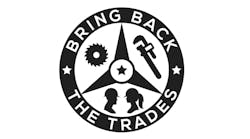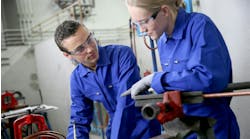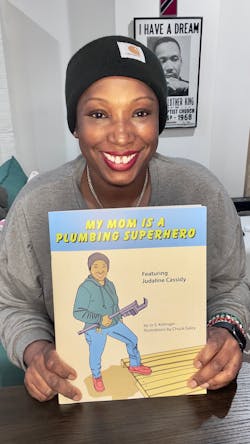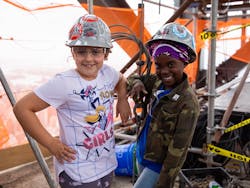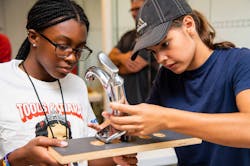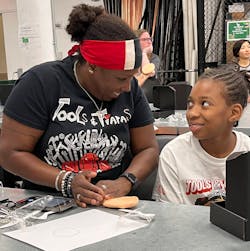Latest from Training
Sponsored
Growing up in the Caribbean’s Trinidad and Tobago, Judaline Cassidy wanted to be a lawyer—and Wonder Woman.
“I didn't have the means to attend university and pursue law, so I tried to figure out the next best free education I could get,” she explains. “It was a school in Trinidad and Tobago called the John Donaldson Technical Institute. And at that school, they offered careers in secretarial, tailoring, culinary arts, electrical and plumbing.
“I figured a lot of women would be applying for the secretarial and culinary arts. I wanted to make the odds in my favor, so I figured I'd try for plumbing and electrical. And then I further reduced it to: electrical, you get shocked; plumbing, you get wet. And that's how my love of affair with plumbing began.”
Cassidy was one of the first three women to learn plumbing at John Donaldson. Her marriage brought her to the United States, where she worked as a nanny and housekeeper before eventually finding her way back to plumbing. She has practiced her plumbing trade for more than two decades in metro New York City.
Her plumbing career was challenging in the beginning. “Back then, many African Americans couldn't get on jobsites,” Cassidy recalls. “So, they formed coalitions to help get construction jobs within their neighborhoods.”
Her first US plumbing job came from a neighbor’s tip. However, the foreman didn’t want her on the jobsite.
“I love to negotiate; like I said, I wanted to be a lawyer,” Cassidy notes. “I told him if he lets me work for the day, he gets a day laborer and doesn't have to pay me anything. And if I'm good at plumbing, we could take it from there. He wanted to prove that I didn't know anything about plumbing; he didn't know that I went to school for it.”
The company took her on, and a mentor paved the way for her to join the Staten Island Plumbers Local Union No. 1—the first woman to do so. Thus began her 25-year (and still counting!) plumbing career.
Creating Princess Warriors
“If you do any kind of research on women who have left the trade, they have never left because the work is too hard or the equipment too heavy,” Cassidy explains. “The job itself is not a deterrent for women; it's all the barriers people put in our way.”
In her research, she found that since 1970, only 3% of women in construction work with tools. “I wanted to see a change in our industry; I wanted to see that needle move from 3%, and it has,” Cassidy explains. “I believe the collective work that women like myself and in other organizations are doing is starting to make the needle move. About four, five years ago, it started moving: 3.9%. I'll take that. I wish it were more, but I'm grateful it's moving now.”
Tools & Tiaras is an avenue for young girls and women to learn confidence in themselves to work in “nontraditional” fields, which our society does not encourage women to pursue. Its mission is to demonstrate to girls that “Jobs Don’t Have Genders.”
It accomplishes this by exposing girls ages 6 to 14 to hands-on projects in carpentry, electrical, plumbing and automotive (mechanical, industrial and technical trades) at summer camps, conferences and career workshops.
“You give me a challenge and I want to figure out how to solve it,” Cassidy says. “Girls are driven by their dreams and passion when they are young. And then, around 10 and 11, society starts to tell them they can't do something because it’s for boys; this over here is for girls.
“I said to myself, what if I created a group of warriors? A group of young female warriors who believe they are awesome, fearless and strong—and nobody can take that away from them. I call them my Princess Warriors. What change would we see in the world as they grow up?”
Not all Princess Warriors will end up in construction, but as they grow older, they will always remember the roots that gave them their start: Tools & Tiaras.
“They could grow up to be senators, lawyers and others who look favorably on the trades, right?” Cassidy remarks. “Right now, they're starting to go to high school and junior high school. They keep coming back to camp and bringing in friends. Give us four or five more years and see these girls begin and grow in their professions.”
Leadership, Confidence and Pride
“I tell them they're boss ladies,” Cassidy notes. “They need to know from a young age that nothing is wrong with being a boss, being a leader. I teach them to be leaders like I am. However, I let them know I'm not perfect; I make mistakes. Be empathetic, but don't be afraid to be a leader.”
The Princess Warriors not only learn technical trade skills, they learn life skills.
“We have total ownership of life skills,” Cassidy explains. “So our girls learn finances, self-defense, debates, public speaking, meditation, yoga, cooking, etc. We create warriors and want to see them go out there and change the world. We see the difference.”
She would like to add an entrepreneurship course as creating a business requires different skill sets than plumbing: “I wish I'd learned that younger, sooner. I had finance classes in Trinidad and Tobago, but they weren’t the same. You need to know how to grow your money, how to invest it. I want to empower our girls with tools they can use with their hands and those they can use in business.”
Cassidy proudly talks about the success stories Tools & Tiaras has had in the roughly six years since it was established: Penelope, the first and only girl on her robotics team; Samantha, who is studying engineering at an aviation high school; Izzy, the girl who fixes everything in her parents’ house; Tanzira, who is starting college; Autumn, who wants to be an architect; and so many more.
“The girls, I love them, I really do,” she says. “I don't like to do anything with emails and grant writing and all that; just put me in front of the workshop with the girls.”
What do their parents think? “Oh, they love it!” she says. “They see the changes in their daughters; they see their daughters light up with confidence.”
Cassidy acknowledges that she struggled with confidence early in life, partly because she has dyslexia.
“I didn't know that I was until later in life, but I struggled with the math portion of plumbing, not so much theory and the actual hands-on,” she explains. “It wasn't an impediment because people who have dyslexia always find ways to compensate and make whatever it is work. Many entrepreneurs have dyslexia, so now I consider it my superpower.
“I have no struggle with my confidence in being a plumber. I walk around with the most pride and an I-know-it-all kind of attitude—in a good way!—about plumbing.”
She also would like to see more visibility and a rebranding of the trade. “Not so much focused on the blue color aspect, but to show that we are equal in earning a good salary as other people, which comes along with pride,” Cassidy says. “Technology also plays a large role in construction today; we must get that message across, too.”
Growing up, Cassidy was extremely poor; being a plumber has been a game-changer for her. And she wants young women to have that same experience in a career that truly helps people.
“I think nothing can be more satisfying than building something with your hands, even if it's something you got in the mail and you had to put it together,” Cassidy notes. “When you accomplish it, how do you feel? That feeling is what the girls get. Building a table or soldering something; if I can do this, I can do anything. That's what we want to instill in them, that they can do anything.”
Kelly Faloon is a contributing writer to CONTRACTOR magazine and principal of Faloon Editorial Services. The former editor of Plumbing & Mechanical magazine, she has nearly 35 years of experience in B2B publishing, with 25 of those years writing about the plumbing, heating, cooling and piping industry. Faloon is a journalism graduate of Michigan State University. You can reach her at [email protected].

Kelly L. Faloon | Freelance Writer/Editor
Kelly L. Faloon is a contributing editor and writer to Contractor, Contracting Business magazine and HPAC Engineering and principal of Faloon Editorial Services. The former editor of Plumbing & Mechanical magazine, Faloon has more than 26 years of experience in the plumbing and heating industry and more than 35 years in B2B publishing. She started a freelance writing and editing business in 2017, where she has a varied clientele.
Faloon spent 3 1/2 years at Supply House Times before joining the Plumbing & Mechanical staff in 2001. Previously, she spent nearly 10 years at CCH/Wolters Kluwer, a publishing firm specializing in business and tax law, where she wore many hats — proofreader, writer/editor for a daily tax publication, and Internal Revenue Code editor.
A native of Michigan’s northern Lower Peninsula, Faloon is a journalism graduate of Michigan State University. You can reach her at [email protected].
